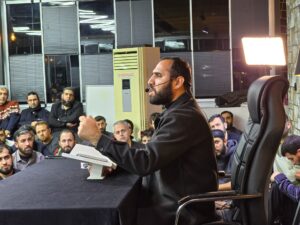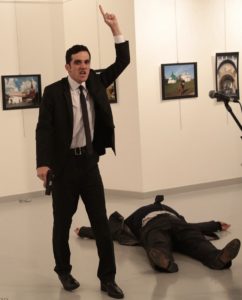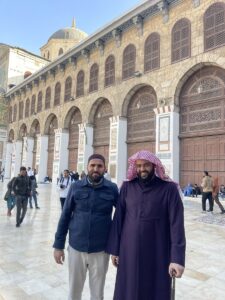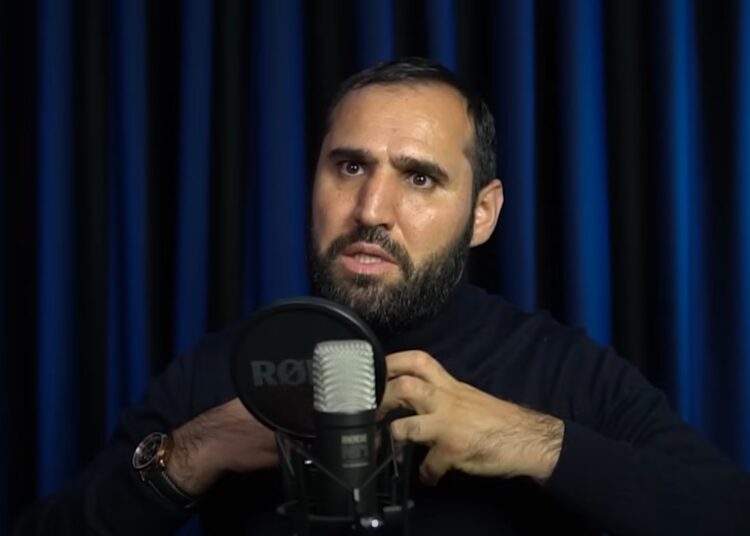Abdullah Bozkurt/Stockholm
A man who serves as the spokesperson for the Turkish al-Qaeda network and has a long history of collaboration with Turkish intelligence agency MIT has stated that Syria’s victory signals the impending downfall of Israel, Spain and Arab states. He acknowledged Turkey’s pivotal role in what he described as the revolution in Syria, while framing the conciliatory remarks made by the new jihadist leaders as astute political maneuvers to avoid the errors committed by the Islamic State in Iraq and Syria (ISIS).
In an interview posted on his YouTube channel on December 22, Abdulkadir Şen — a radical figure who has evaded multiple terrorism investigations in Turkey — offered insights into the mindset of the jihadist group now controlling Damascus and much of Syria. He outlined predictions about global jihad’s evolving tactics, new targets and the pivotal role played by the Islamist government of Turkish President Recep Tayyip Erdogan in supporting and facilitating the jihadist campaign.
“The message of this [Hay’at Tahrir al-Sham, HTS] revolution is directed at [Egypt’s President Abdelfattah] al-Sisi and Israel,” he declared, adding, “Afghanistan was the first, Syria is the second. From now on, we don’t know where it will be, but I say, ‘See you in the new revolution.'”
Şen predicted that the events in Syria would be replicated in other countries. “Revolutions are contagious,” he said, adding, “I believe that in the coming period, there could be movements in new places, starting with Yemen.”
Şen issued a warning to Jordan and Egypt, predicting a major conflict if they oppose the new rulers of Syria. He emphasized that both countries are already in a fragile position due to widespread dissatisfaction with their regimes among their populations. He further claimed that the recent developments in Syria were sparked by Hamas’s military actions against Israel and predicted that the Israeli government would ultimately have no choice but to engage in negotiations with Ahmed al-Sharaa (Abu Mohammed al-Jolani) in Syria.

Abdulkadir Sen is seen delivering a lecture on the Syrian jihadist campaign to his followers on December 28, 2024 in Adana, a Turkish province that is home to US and NATO alliance troops.
Şen’s remarks underscored al-Qaeda’s long-held aspirations to extend its campaign to Europe. Recalling his first Friday prayer at the iconic Umayyad Mosque in Damascus shortly after HTS seized control of the city, he noted that worshippers performed the Andalusian nasheed (song) following the prayer. “Not only Palestine, but eyes and minds were on [Spain’s] Andalusia as well. Imagine that. We lost Andalusia six, seven centuries ago, yet it still lingers in our minds,” he said, hinting at the symbolic significance of Andalusia when Spain was governed by Muslims in the group’s ideology.
Şen expressed his gratitude to the Erdogan government, stating, “If Turkey hadn’t intervened in this process [the Syrian conflict] in 2016 — by making agreements with Russia, sending troops, creating buffer zones, or conducting patrols — this revolution would have ended. If they hadn’t provided such strong support [to HTS and other jihadist groups], it would have been over.”
“If Turkey hadn’t been involved, this revolution would not have occurred. There is no doubt about this,” he emphasized, saying that the people he spoke with in Syria shared the same perspective.
He reiterated Erdogan’s remarks likening Syrian and Palestinian jihadists to the Kuvay-i Milliye, the irregular militia instrumental in Turkey’s War of Independence following World War I — a symbolic comparison aimed at elevating the jihadist groups’ standing in the eyes of the Turkish public.
Commenting on al-Sharaa’s conciliatory remarks, Şen characterized them as shrewd tactical maneuvers. “I think Jolani is pursuing a wise political strategy. He’s playing with shades — it’s not just black and white; there are gray tones in between. Whoever plays well with those gray tones wins, and that’s what he’s trying to do. He’s working to reduce enemies, gain benefit and repel harm,” Şen said.

“He is playing a very clever political game. Some people seem to want Jolani to come out and declare war on the entire world — on Israel, America, Europe, Russia and others, just like ISIS did in Iraq and Syria. Then, of course, the whole world would gang up against him,” he said.
Şen and his associates are apparently aware of the challenges the jihadist group faces in Syria, which is not eager to escalate its campaign just yet, preferring to establish a solid footing in Syria and consolidate its power first. Hence, the moderate remarks from the new rulers of Syria appear to be a tactic to buy time rather than a fundamental shift in their ideology.
Şen has collaborated with Turkish intelligence, along with his brother İbrahim Şen, a former Gitmo detainee and a convicted, high-profile al-Qaeda militant. The two jointly operated al-Qaeda cells in Turkey, facilitated the movement of jihadists into Syria starting in 2011 and supplied them with resources, with the assistance of the Turkish Intelligence Organization (Milli İstihbarat Teşkilatı, MIT).
İbrahim Şen was detained in Pakistan over his al-Qaeda links and transferred to Guantanamo, where he was held until 2005, when US officials decided to turn him over to Turkey. According to a 2014 investigation conducted by the Turkish police, he had been working with Turkey’s MİT since the start of the Syrian crisis in 2011, aiding in efforts to overthrow the Bashar al-Assad regime in alignment with the political objectives of the Erdogan government.
Although both brothers, members of a secretive, tightly knit al-Qaeda cell in Turkey, were the subjects of terrorism investigations, the Erdogan government intervened in 2014, halting those probes. Prosecutors and police chiefs who had investigated the unlawful activities of MIT, which collaborated with the al-Qaeda network in fueling the Syrian civil war, were subsequently punished.
Excerpt from a 2014 terrorism investigation into a Turkish al-Qaeda network operating in Syria, which identified Abdulkadir Sen and others:
According to the 2014 investigation file, a copy of which was obtained by Nordic Monitor, İbrahim Şen was operating in Syria in close coordination with his brother Abdulkadir, who was responsible for supplying the materials needed by al-Qaeda jihadists in Syria. Abdulkadir Şen also visited Syria several times to participate in armed clashes alongside his brother, according to wiretaps obtained as part of a terrorism investigation under case file number 2012/1361.
Abdulkadir Şen has been using various front NGOs to transport much-needed supplies to jihadists under the guise of humanitarian aid. One of these NGOs was the Global Humanitarian Aid and Political Training Center (Küresel İnsani Yardım ve Siyasi Eğitim Merkezi, or KİSEM), while another was the Foundation for Human Rights and Freedoms and Humanitarian Relief (İnsan Hak ve Hürriyetleri ve İnsani Yardım Vakfı, or İHH), an Islamist organization that works closely with Turkish intelligence in providing logistical support for al-Qaeda’s global operations.

Abdulkadir Şen’s involvement was also discovered during the investigation into the murder of Russian Ambassador to Turkey Andrei Karlov in December 2016. The case file revealed that Mevlüt Mert Altıntaş, a 22-year-old jihadist police officer, was inspired by a book titled “Tüm Yönleriyle Suriye Devrimi” (Syrian Revolution in All Aspects), written by Abdulkadir Şen. The assassin had traveled to Istanbul on October 8, 2016, two months before the murder of the Russian envoy, to meet with Şen in person. The meeting was arranged by Enes Asım Silin, a 31-year-old al-Qaeda suspect who had been in communication with the killer for some time.
Just like in the 2014 al-Qaeda probe, the Erdogan government shielded Abdulkadir Şen from involvement in the investigation into the murder of Karlov. Under government directives, prosecutor Adem Akıncı, who drafted the indictment in the Karlov murder case, decided to drop the investigation into both men. He recorded his decision of non-prosecution in the indictment filed on November 22, 2018. Instead, the prosecutor attributed the murder to a group critical of the Erdogan government, without providing any evidence to substantiate the charge.
Today, Abdulkadir Şen has been traveling across Turkey, delivering lectures on al-Qaeda’s jihadist ideology and presenting the Syrian conflict as a success story for jihadist groups. He is officially on the payroll of Turkey’s state-run Muş Alparslan University as a lecturer and is listed as a post-doctoral researcher at Qatar’s Hamad Bin Khalifa University and a member of the Qatar Foundation for Education, Science and Community Development.
The Syrian takeover by HTS has emboldened various jihadist groups in Turkey, particularly al-Qaeda and its affiliated or splinter factions. Neither the police nor the prosecutors dare take action against these groups, which appear to be protected by the Erdogan government due to their secret collaboration with Turkish intelligence agency MIT.












